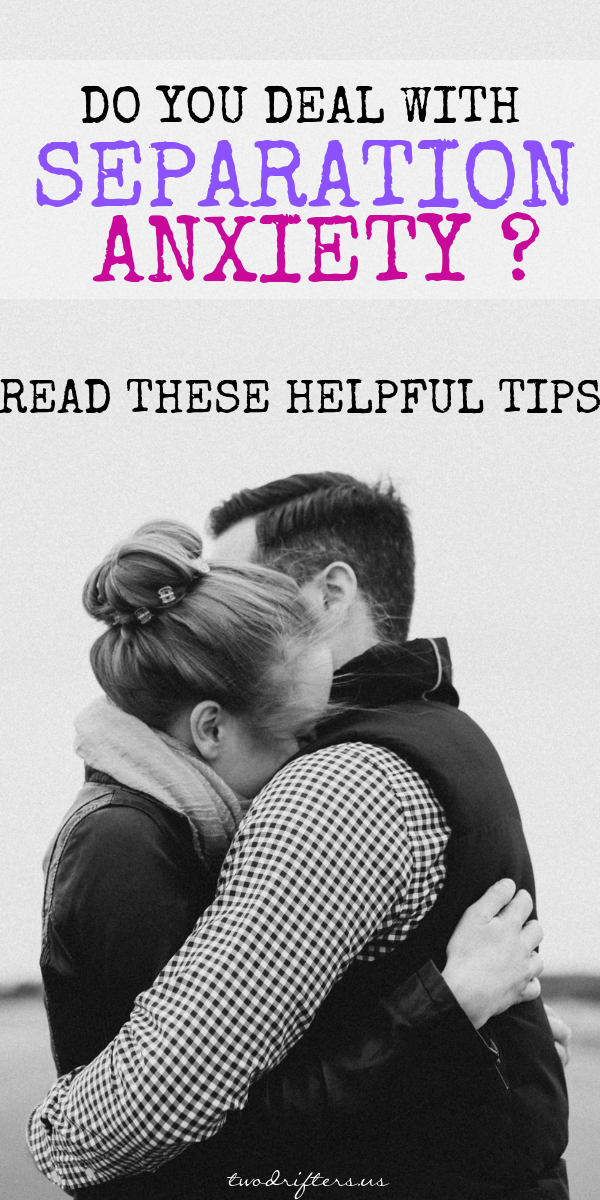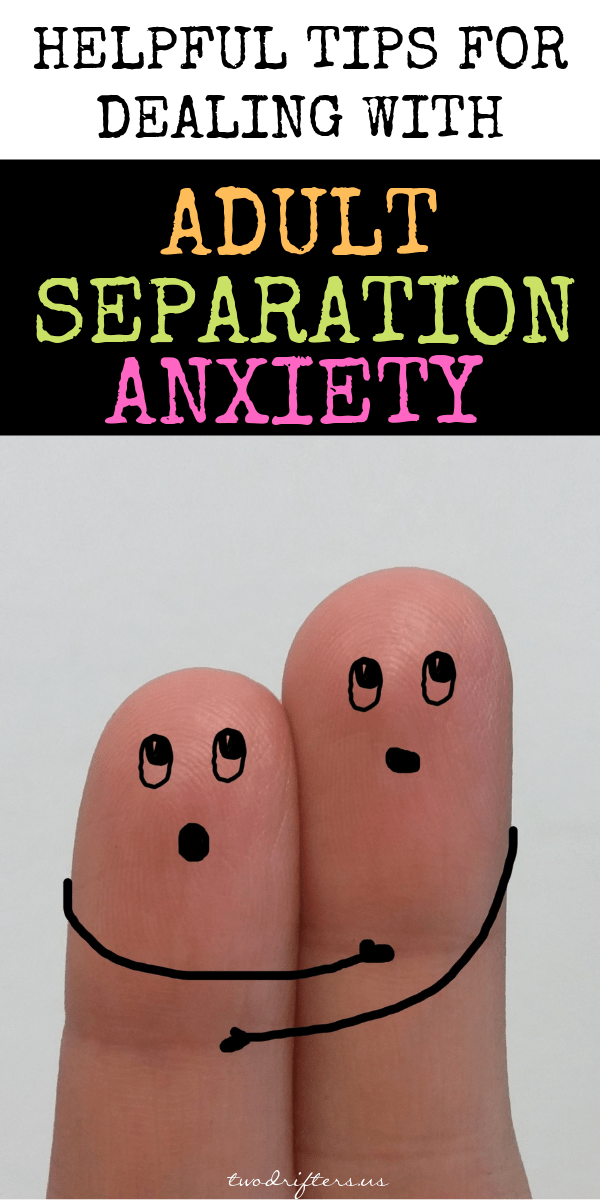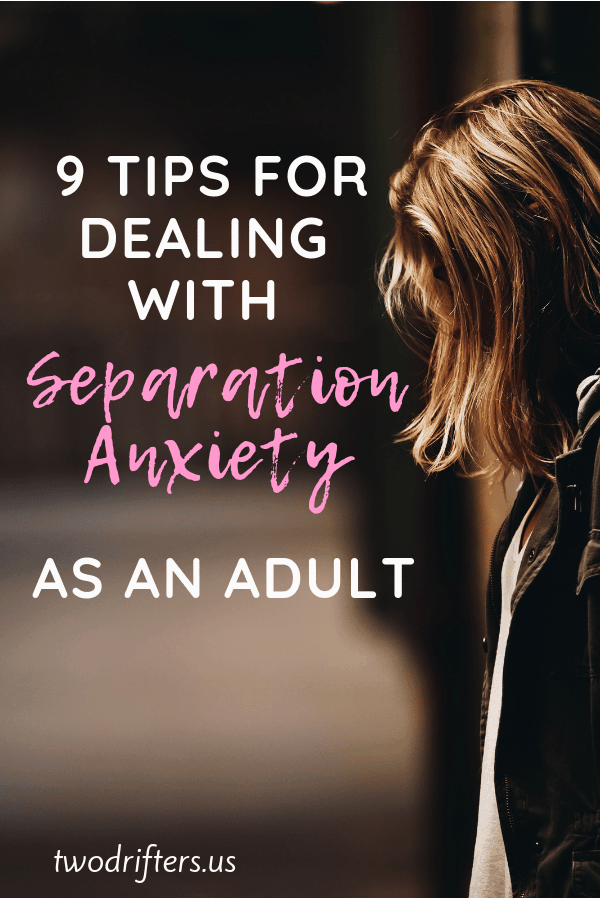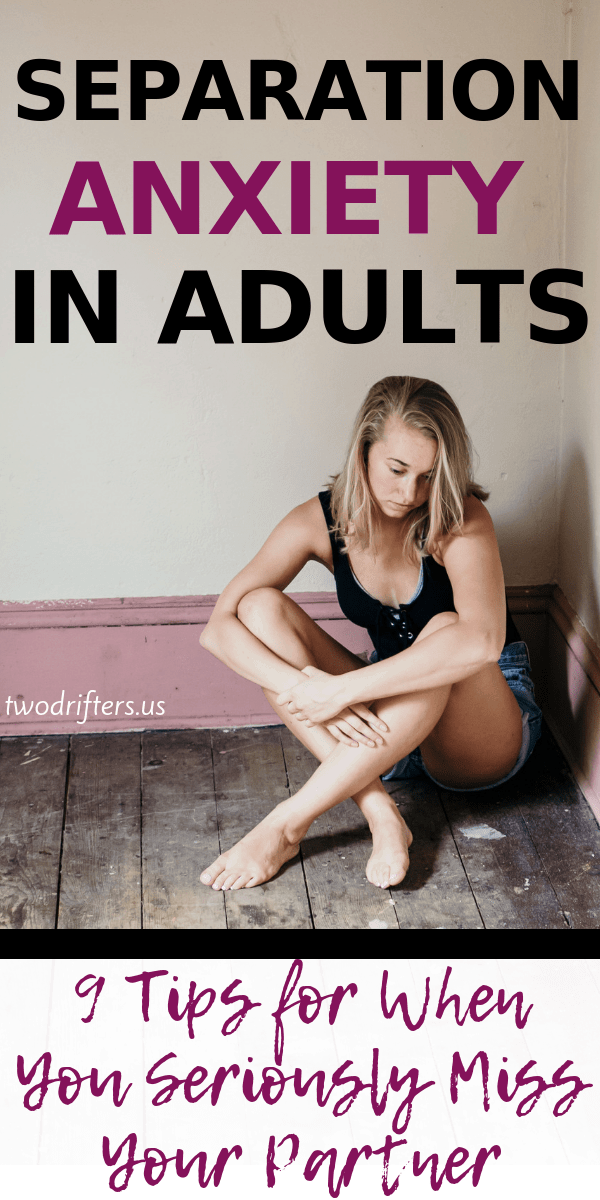This post may contain affiliate links. Read our disclosure page for full details.
Do you suffer from separation anxiety in relationships? You are not alone. This is my personal story of my experience with separation anxiety from my partner, and the tools I used to help relieve and reduce my anxiety.
Absence makes the heart grow…anxious.
If you don’t know what I’m talking about, you’re lucky. Chances are good that you don’t experience any sort of adult separation anxiety in relationships. But if that opening phrase is all too clear, jump in and let’s talk.
Having separation anxiety from a boyfriend, spouse, or partner can be awful. It was for me for a long time. And while I still don’t *LOVE* being apart from my husband, I’ve developed some ways to help myself better manage it. I’m going to share those tips with you.
My Story – I Was a Separation Anxiety Girlfriend
I’ve always been a sensitive, emotional person, especially as a kid. As I grew into an adult, in many ways, that part of me didn’t change.
Sure, I grew braver about some things and learned to laugh at myself and be more confident and strong, but anxiety followed me into adulthood. Anxiety in relationships became par for the course. One of the particular ways it manifested was in separation anxiety in my relationship.
When my now-husband Nathan and I were first together, we were long distance for a good year and a half. This was really tough on me, but the toughest part was always the saying of the goodbyes; the departure.
When Nathan was visiting me, I would start to grow terribly anxious when the end of the trip was growing near. Even a week before he was scheduled to leave I would get bouts of anxiety and nausea. And crying. Lots and lots of crying.
Flash forward to our separation, I would cry when it was happening, and for several days before. Frankly, it sucked, but generally, once we’d said goodbye and were busy living our lives during the time apart, this anxiety would begin to dissipate a bit.
These days, I feel like I can deal far better with the temporary separation. But recently, we spent nearly 3 weeks apart, the longest since we’ve been married. As the date of Nathan’s departure grew closer, I found myself feeling that same familiar panic. That lingering anxiety and sadness about being apart from each other was still there.
I realized that, if I feel this way, as a 33-year old married woman, chances are, other people in relationships must feel this way, too. Maybe I can offer some words of encouragement, wisdom, and guidance.
I’m not an expert, but I can definitely say I’ve been there and know exactly what it’s like. Let’s talk about managing relationship-related separation anxiety in adults, and how to make the most of extended separations.
A Quick Note
I want to note that I am not a trained psychologist or mental health professional. All of the information contained in this article is from my own experience (plus some Internet research). Also, my separation anxiety is fairly high-functioning, as it typically does not cause interferences in my daily activities.
If you feel like you might be suffering from a serious separation anxiety disorder, or your anxiety is greatly impacting your ability to function, I suggest finding a licensed, trained mental health provider in your area. Adult separation anxiety disorder is a real thing, and there are professional and clinical ways to help alleviate it.
Read Next: 12 Principles for Lasting Love: Relationship Advice for Couples
How to Deal With Separation Anxiety in Relationships
Over the years I’ve learned how to manage missing my boyfriend, missing my fiance, and finally, missing my husband. Here are the things I keep in mind and the things I do to help myself when I’m plagued by separation issues in relationships.
Know that the separation is temporary
No matter how long you and your loved one have to be apart, it is super helpful to remind yourself of the temporary nature of the separation.
It. Will. End.
This can be easier to deal with if you’re faced with a shorter period of time apart, but if you’ve got a lengthy separation ahead, try breaking it down into smaller increments to help you manage better. Can you get through a week? Then another week? I bet you can!
Thse the rest of these tips to help you out!
What if you have a fear that the separation WON’T end? I think this is what affects me. What if saying goodbye to Nathan is the LAST TIME I get to say goodbye to him? It’s an extremely morbid thought, but somehow, my mind goes there.
If that is something you also experience, I’d urge you to remember that uncertainty is always a constant part of life. This is a scary thing in many ways, but it also can serve as a reminder that your separation is no different than your typical daily life.
This may not be super comforting, but at least it lets you know that there’s no need to have additional fears with the coming separation.
I suggest reading the book Comfortable With Uncertainty.
When I fear uncertainty in separation, it also helps me to focus on the things I know for sure:
Nathan is a safe person. He takes precautions. He always returns. When we are apart, he calls or texts to let me know when he’s arrived somewhere. So, although we are apart physically, I trust that I can count on him to be safe and to return to me when the separation ends.
Let your partner know how you feel
Don’t suffer alone with your separation anxiety fears. This is a great opportunity to open up to your partner about your feelings. It’s important that your partner knows you might need a little extra lovin’ and care during this time apart. (Read more on getting through hard times together).
He or she can then be mindful, perhaps checking in more often or simply being more sensitive to your needs and feelings.
Nathan doesn’t experience separation anxiety when we’re apart, but he knows that I do. To help support me, he makes sure to text me frequently when we’re away from one another and he video chats me nearly every day. This might be more than he himself needs, but he does it for me out of kindness and his commitment to our relationship.
Lean into the discomfort, it’s ok
Okay, you might feel shitty at some point during your separation. The point of these tips is not to help you avoid all of those feelings, but to healthily deal with them and work through them, and to alleviate the painful feelings when necessary.
But, it is perfectly okay to let yourself feel sad. Sometimes experiencing and sitting with your emotions helps you process them. You know how they say a “good cry” can be really cathartic? This is absolutely true.
Let it out. Let yourself feel crappy.
I’m almost certain that you’ll feel better afterward, and better able to manage your feelings. Sometimes, it even helps you redirect your energy. I know after I’ve cried and felt mopey, I often feel refreshed and ready to redirect my attention to a more beneficial, productive activity. (Even if that “productive” activity is bingeing Netflix.)
Do things that are important to you while you’re away from your partner
One of the top tips for handling separation anxiety from a partner is to take action. I can’t stress enough how important it is to take advantage of this alone time. You have extra time available to you right now; grab that bull by the horns!
So after you’ve had a good cry, it’s time to do something meaningful; something that matters to you.
Set aside some hours to focus on a personal hobby of yours. Or tackle a challenge you’ve been meaning to attempt. This might not be something crazily ambitious, but you could read a novel you’ve been putting off for a while.
Or maybe you can do something that helps you feel close to your partner AND deal with the separation anxiety at the same time. A great example would be getting some family photos printed and placed in albums. You can choose your favorite photos of you and your partner (and other family and friends) and get creative putting them in photo albums or framing them in your home.
You’ll be thinking of them while you expend creative energy. This activity will make you feel warm and fuzzy inside, plus give you a sense of accomplishment, which will definitely help to reduce some of your anxiety.
Keep active, both mentally and physically
To alleviate separation anxiety symptoms in adults—or even just general anxiety—physical activity can be crucial.
If you have a regular exercise routine, stick to it while your partner is away. Or if you’re the one going away, make an effort to find time for physical movement during each day.
Truthfully, staying active and busy makes the time go by more quickly, so your separation will be over before you know it. Keeping busy is one of the key ways I help my separation anxiety. PS: It also helps with general overthinking.
Talk about your communication plans beforehand
One issue that might be contributing to your relationship separation anxiety is not having a firm communication plan.
Maybe you’re not sure when you’ll talk to your partner. How often will you Skype? Will you be annoying them if you text 20 times per day?
Having these discussions before the separation even begins is crucial. Not only does it ensure you both have appropriate expectations in place, but it can also eliminate a secondary source of anxiety. And helps your partner feel more secure.
Be sure both of you are committed to your communication schedule. Talking or messaging at the same time every day can be helpful (it’s also a great thing for you to look forward to daily), but this is not always possible. Be realistic and reasonable with one another.
And be flexible, too. Know that occasionally, life gets in the way and communication might be delayed. Remember your partner has the best intentions and don’t freak out or spiral if your communication changes or doesn’t happen on a given day.
Feeling anxious? Go do something active, participate in a beloved hobby, or call a friend. Soon enough, you’ll be talking to your partner again. And soon they’ll be back with you, as well.
Do something meaningful for each other during your time apart
Missing your boyfriend? Girl, channel that energy and do something sweet for that other person.
Spending time apart not only gives you some extra free time, it also provides you with the chance to gather perspective on your relationship. I can think of no better time to sit down and pen a hand-written letter to your love. This is such a lost art.
Writing is healthy and healing, but you’ll feel especially grounded as you write about what you love about your partner. Give it to them when they get back and watch their heart well up with gratitude.
Maybe your partner isn’t into words. (Perhaps Words of Affirmation is not his or her Love Language). That’s cool.
Do something that will be special and meaningful to them, that speaks to them in their language. It doesn’t even need to be fancy. Has your wife been pestering you to clean out the garage? Why not tackle it while she’s gone and give her an awesome surprise when she returns? These simple actions go a long way, I promise.
Focus on the other important relationships in your life
If you’re wondering how to deal with separation anxiety from your spouse, boyfriend, girlfriend, etc., one of the best cures is to spend time with other loved ones. Don’t forget about those other important relationships in your life: your siblings, parents, friends, or even your children.
You might feel sad to be separated from your partner for a period, but there are dozens of other people who would love to spend some of that time with you.
Make a plan to have lunch with an old friend. Call your mom. Take your children out for a super fun outing.
These things will warm your heart and remind you that you are oh so loved.
Plan something special for when you will see each other again
One of my favorite methods for how to cope with separation is to focus on the reunion. When you and your significant other see each other again after a being apart, it’s a cause for celebration.
So instead of obsessing about the time away from one another, plan to do something sweet and special when you reunite.
Maybe buy some special lingerie for when you greet your husband at the door upon his return. Plan a fantastic dinner to cook for your girlfriend (her favorite) when she comes over after her trip. Or buy your sweetheart a simple little gift to say, “hey, I love you, and I’m so glad you’re back.”
No matter what you choose, be sure to live in the moment and embrace the joy of being back together.
After all, the separation does do one thing right: it makes that reunion so much sweeter.

Amy Hartle is the author of Do You Love Me? How To Stop Seeking Reassurance in Relationships, a book on reassurance seeking and relationship anxiety. Both her book and this blog are born of personal experience; Amy shares expert relationship advice from the lessons learned during her own 10+ years with her husband, as well as couples travel tips and romantic getaway recommendations, all gleaned while traveling the world together.










